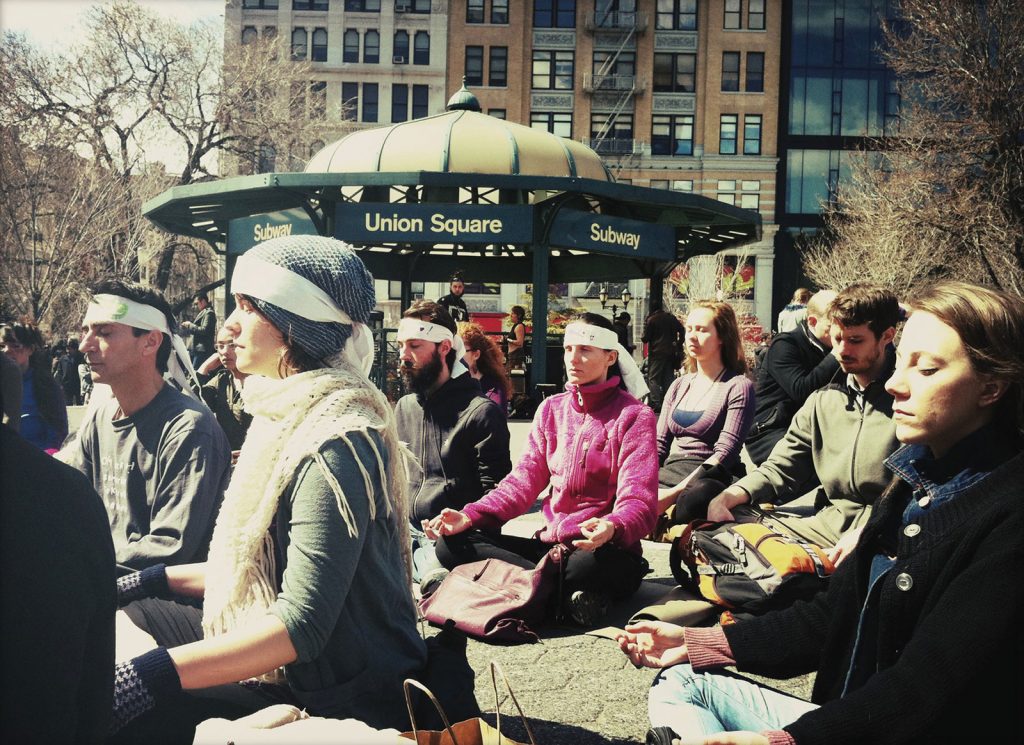Each week tricycle.com features a Tricycle Retreat video teaching delivered by a Buddhist teacher. This column introduces Fleet Maull’s retreat, “Social Awakening” (May, 2012). Supporting and Sustaining Members of the Tricycle Community can join the retreat here.
Even with the minimal attention I’ve given to the televised and online political scene of late, the cartoonlike quality of our fractured, fear-based, and largely exploitative body politic in the U.S. is all too painfully obvious. How did we end up in such a mess? Dare we imagine anything better? Is it really as dark and hopeless as it appears, or is this just the current manifestation of the amazing and wondrous human condition we all share?
Many in my generation have been working for progressive social and political change for 40 years or more, and for some portion of that time we have tried to inform those efforts with a spiritual or contemplative context. We have tried to move beyond the divisive, angry, and polarized “us versus them” social action and politics of our youth. Successive generations have taken up their own causes and continue the search for a spiritually informed, contemplative approach to social action. However, many of us—young and old alike—have given up on the mainstream political scene, seeing it as hopelessly corrupt, ineffective, and bordering on irrelevant, except for the mostly negative impact it has on our lives. Our anger can motivate us to get involved, but it won’t sustain us.
As an itinerant meditation teacher and social activist, I enjoy meeting young meditation practitioners in their twenties and thirties all across the U.S. on a regular basis. I find these young people to be almost universally interested in and even passionate about the intersection between the spiritual life and social activism. They are hungry for teachings on socially engaged Buddhism, socially engaged spirituality, and contemplative approaches to social and political engagement.
While there are many wonderful examples of contemplative approaches to social engagement, most such spiritually informed efforts still begin from a perspective of there being something fundamentally wrong with the current situation or the way things are. Many Buddhist traditions emphasize in various forms the innate goodness and awakened nature of all beings. Many traditions also share the aspiration to lead all sentient beings to the realization of this innate goodness. But how does this translate into social action? What about society itself, which appears so deeply challenged by materialism, injustice and conflict? Could we entertain the notion of the basic goodness or innate awakened nature of society itself? Could we imagine such a radical vision for social and political engagement as one grounded in seeing and experiencing society itself as essentially and innately good. What about governments, corporations, and other social institutions—can we recognize their basic goodness?
In his presentation of the Shambhala teachings, Chögyam Trungpa Rinpoche not only exhorted us to embrace our shared responsibility to create enlightened society, he also proclaimed the radical view that the path to creating enlightened society begins not just with the realization of the basic goodness of all beings but also with the realization of the basic goodness of society itself. “Society does contain profundity and sacredness,” Trungpa wrote in Work, Sex, and Money, “The sacredness of society is potent and powerful.”
Trungpa’s notion of the basic goodness of society is not a simplistic expression of good versus bad. It is a calling to see the sacredness in the totality of society, where there are “flashes of positive energy, flashes of destruction, flashes of hatred and love.” He talks about a big perspective, a mandala perspective that recognizes the essential goodness or sacredness and thus the potential for awakening in the wholeness and totality of our societal situation as it is.
In the “Social Awakening” retreat, we will explore how our individual spiritual path and our aspirations to work for positive social change intersect. We’ll look at the traditional bodhisattva vow to save all sentient beings, first from the traditional “motivation perspective,” where the liberation of all beings becomes our motivation for attaining liberation, and then from the more radical perspective of collective awakening or social enlightenment. What does it mean to awaken together, to practice social enlightenment together? How do we progress from anger at injustice to doing something positive to bring about change?
Conventional contemplative wisdom states clearly that the path begins with ourselves, that we have to do our own work of cultivating mindfulness and awareness. We are told that we need to make friends with ourselves and develop lovingkindness and compassion before venturing very far into the sphere of bodhisattva activity or engaged spirituality. But what if this is an unnecessarily limited or even mistaken view? What if the path actually begins with us, the collective us, with interbeing, as Vietnamese peace activist and Zen master Thich Nhat Hanh teaches? What if the paths to both genuine liberation and collective awakening are inseparable and best informed by a social view of spiritual development from the very beginning?
At a recent meditation retreat, Sakong Mipham Rinpoche, the current Shambhala lineage holder, spoke about the necessity of seeing the basic goodness in society and asked his students to “take a seat at the table of society and gently interject, Can we please consider an alternative possibility, which is that people and society are basically good.”
In the “Social Awakening” retreat, we explore through both traditional and innovative, awareness-based community practices how entertaining the possibility of innate awakened nature and basic goodness not just of all beings but of society itself changes our practice, and how developing confidence in this view can transform our path and society.
Thank you for subscribing to Tricycle! As a nonprofit, we depend on readers like you to keep Buddhist teachings and practices widely available.
